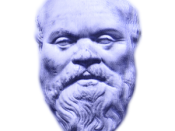Aristotle dictates that ethical theory is a science. It is different from other systematic approaches, in that it is not an exact science. Next, this paper will outline some of the philosopher's method in characterizing a "good," especially the most important "good" happiness and the difficulties that arise in evaluating it. This is a passageway into finding happiness, and according to Aristotle-virtue in a good is of fundamental importance to this path. We must conclude our discussion of Aristotelian morals with his thoughts on the organic being and its properties: rationality and irrationality, and their interaction with an idea of a "Golden Mean."
All forms of science desire a purpose. Jurisprudence, for example, tries to instill a universal mode of general rules (laws) in a society, so we lack anarchy and can function more cohesively. Medicine, as another science, earnestly conjures up methods to prevent and mitigate ailments and at other times attempts to increase longevity.
Likewise, just as the previous two sciences, Aristotle's study of ethics attempts to improve our lives. So the distinction of this science: for the development of our lives.
In his treatise, especially Nicomachean Ethics (hereafter Ethics), Aristotle has an important tenet: the reconciliation and general consensus of what is a "good." Notably, to identify something that is good, like friendship, is not difficult and many would agree that this is desirable. However, Aristotle argues that difficulty arises in evaluating which "good" is superior to the next. Furthermore, he argues that the platitude with respect to "goods" is happiness. So how does he deduce one's attainment of it?
His methodology, inferring that happiness is the ultimate "good", is based on three characteristics. They are: first, this "good" must be desired for itself. Second, this "good" can not be desired for some other. Lastly,


